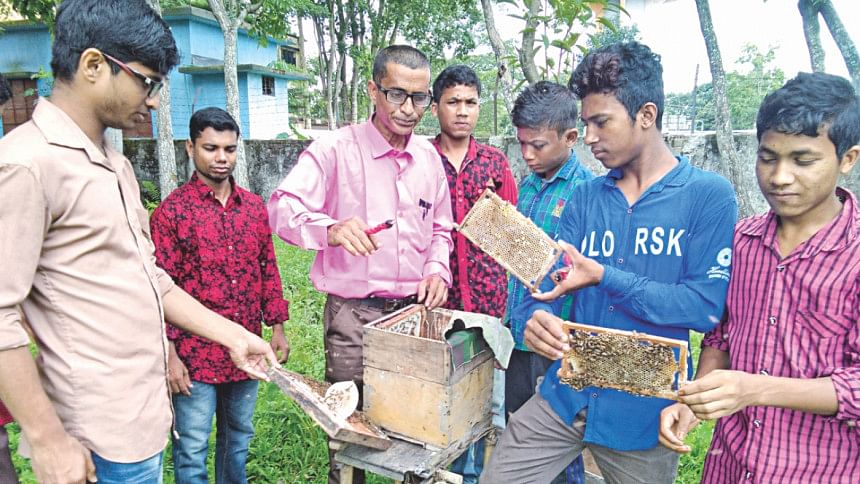Beekeeping: A skill for life

Fifty-two-year-old Mostafizar Rahman is making a change in a unique way by training orphans on the art of making honey, hoping that one day they will become self-sufficient.
Twice a week, he upskills 13 orphans at government-run Kurigram Sarkari Shishu Paribar on the use of wooden bee boxes, bee species, honey collection and preservation, free of charge.
He only trains the adolescent ones, ages between 13 to 15 years, at the orphanage premises as they are able to learn quickly and follow the safety precautions like using gloves and face masks to avoid getting stung.
A resident of Rameshwar Swarma village under Kurigram’s Ulipur upazila, he works as a Trade Instructor for bamboo-cane products at the Department of Social Service.
He took training on making bamboo-cane products like local dala-kula, furniture and mats at Bangladesh Small and Cottage Industries Corporation (BSCIC) in Kurigram 1982-1983 and joined his current job in 1985.
He first showed interest in beekeeping when he suffered a cardiac arrest in 1988 and the physician advised him on consuming high quality honey to lower his blood pressure.
Ever since, he has been producing honey commercially as a second gig, he told The Daily Star last month.
In 2005, he expanded his capacity to 64 bee boxes. Each wooden box costs him Tk 5,000 to Tk 6,000, depending on the size, and has a capacity to hold 200 to 400 bees.
Although he is able to collect half a kilogram of honey every week, the production doubles in the winter as he has to extract honey twice a week then.
Rahman has so far trained a total of 70 youths on this trade. Of them, five are producing honey on commercial basis while 40 others are producing honey for personal consumption.
At present, he has 35 bee boxes in three spots of Ulipur and Sadar upazila and he is able to make Tk 50,000 per month after meeting all expenses and labourer wages.
Rahman pitched his idea to train the orphans to the acting deputy director of the local social service department in January this year and he began his free training in April.
“Locally, honey is still not that popular as a remedy for many ailments. But it is a nutritious and potent liquid that has antioxidants and is linked to a reduced risk of heart disease,” Rahman said, adding that, “Apart from honey production, beekeeping plays a vital role in the pollination of flowers.”
Khairul Islam, 15, who lives at the orphanage, said, “We are learning all about honey cultivation, from start to finish, and we are able to extract honey from the honeycomb now.”

 For all latest news, follow The Daily Star's Google News channel.
For all latest news, follow The Daily Star's Google News channel. 



Comments